ADSactly Literature: Benchmark Theater - Mourning Becomes Electra
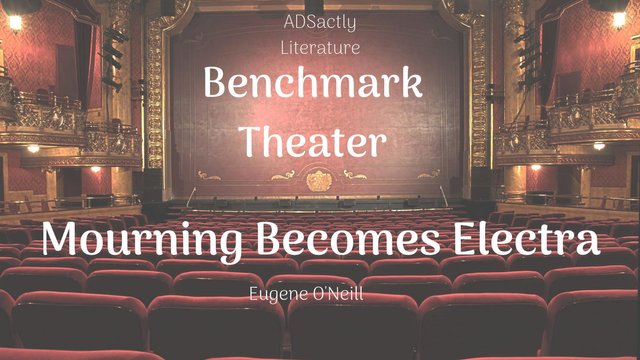
We’ve talked, in the past, quite a lot about literature. We’ve discussed character archetypes, basic story plots, as well as famous literary figures such as JK Rowling and Ernest Hemingway. And looking back at all the topics we’ve covered, I realize, with dismay, that there is one field of writing, a field that is very dear to me, which we’ve ignored almost completely. I’m talking, of course, about theater. While we have talked a little about William Shakespeare’s plays, we haven’t really explored much else and it seems a shame… There is such an incredible, vast array of plays and theater writings out there. And I think it’s time we delve into that world.
Last time, we talked about John Osborne’s classic ‘Look Back in Anger’ and today, we’re crossing the ocean and going back some twenty years to look at Eugene O’Neill’s brilliant ‘Mourning Becomes Electra’.
Now, ‘Mourning Becomes Electra’ is not an actual play, but rather a play cycle, consisting of three separate plays, Homecoming, The Hunted and The Haunting. Well, separate in the purely technical sense, because they don’t really work by themselves, you have to see them as part of something bigger.
Just to be clear, the title refers to ‘becoming’ as in ‘suiting. According to O’Neill himself,
“By the title Mourning Becomes Electra I sought to convey that mourning befits Electra; it becomes Electra to mourn; it is her fate; black is becoming to her and it is the color that becomes her destiny.”
Just thought I’d clarify that, as I have seen it translated as if mourning actually becomes (transforms) into Electra. Now, let me tell you a bit about each of the three plays.
In Homecoming, we discover the two main female characters of the cycle, Lavinia “Vinnie” Mannon and her mother, Christine, awaiting the return of Ezra Mannon (the father) and Orin Mannon (brother) from the war. They are in stark opposition, with the mother being haughty and beautiful and the daughter being stern and cold.
The main conflict between the two women is that Lavinia has fallen in love with a Captain who has been courting her, Adam Brant, but she has just discovered that his courting her was just a facade, to hide the fact he’s having an affair with Christine.
Again, the two women are in opposition – where Lavinia is daddy’s little girl and adores her father to the point of unhealthy obsession, her mother admits to hating him and being disgusted by him throughout their marriage.
Lavinia confronts her mother about the affair and the two make a deal – Lavinia won’t tell her father, as long as Christine breaks off the affair.
However, Christine plots with her lover to poison Ezra Mannon and run away with him. The men return from war, Ezra confesses his love for Christine and regrets his coldness toward her and Christine poisons him. The first part of the trilogy ends with Mannon dying.
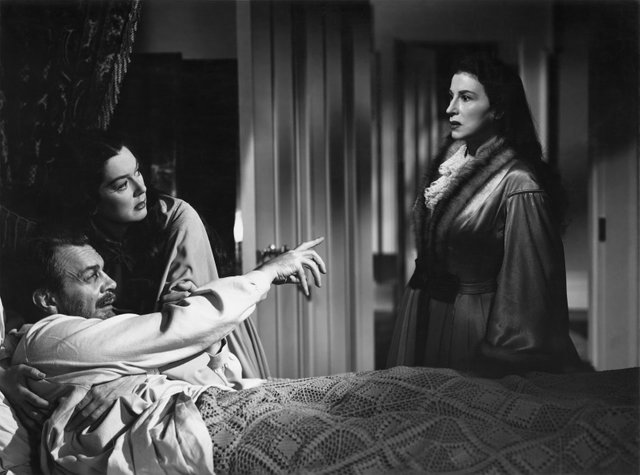
Mannon accusing his wife of murder with his dying breath source
Although they tell everyone he died of natural causes, Lavinia realizes what her mother has done and seeks to convince her brother Orin as well. They sneak unto Brant’s ship and overhear their mother confessing to the murder. They wait for her to leave and, in a rage, Orin murders Brant.
Christine is left heartbroken over his loss, but not for long, because Orin admits it was he who killed him and in despair, Christine Mannon runs into the house and shoots herself.
The third part of the cycle, The Haunting, sees Lavinia undergo a drastic change – where before she was quiet and austere, she now wears bright colors (like her mother) and flirts with men. She practically becomes her dead mother. Orin, however, becomes more and more mournful and quiet and allows Lavinia to order him around (as he allowed their mother before her). They return home after a year-long voyage, to find the house haunted by the ghost of their mother, as well as other dead Mannons. Throughout The Haunting, Orin is consumed by guilt over his mother’s suicide and attempts to confess his sins, but his sister prevents him, since his confession would damn both of them.
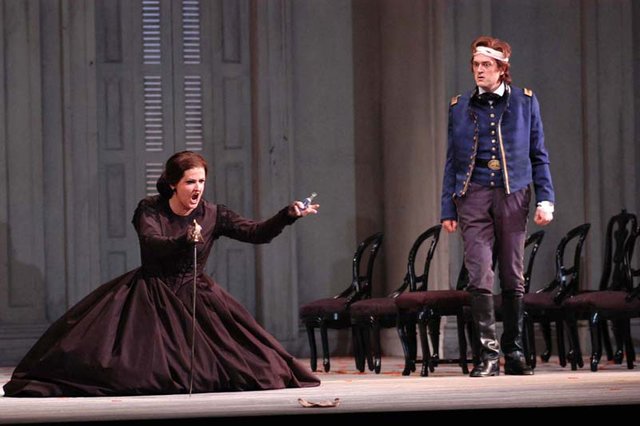
Lavinia and Orin in a 2003 Seattle production
The relationship between the two becomes gradually more tense. Orin wants to marry the neighboring girl, Hazel, but Lavinia won’t allow him, for fear he would tell her the truth. Lavinia in turn attempts to marry Hazel’s brother, but Orin stops her, for fear of bringing another into their twisted family.
Understanding his death would only mean justice, Orin goes off and kills himself and Lavinia, understanding her own mistakes and her own justice, accepts the idea of shunning society and living as an outcast in their family home, with the ghosts of all the dead Mannons. She orders the servant to board up the windows, so that no sunlight may come in and goes off into the darkness.
I hate the daylight. It's like an accusing eye! No, we've renounced the day, in which normal people live—or rather it has renounced us. Perpetual night—darkness of death in life—that's the fitting habitat for guilt!
(Orin)
‘Mourning Becomes Electra’ is basically a retelling of the Greek tragedy Oresteia, by Aeschylus, also a trilogy, which tells the story of Agamemnon who is murdered upon returning from the Trojan War, by his wife Clytemnestra and her lover (in revenge for him sacrificing their eldest daughter at the beginning of the war, so they could sail to Troy).
To avenge their father’s death, Orestes and Electra (hence the title of O’Neill’s play) murder their mother and her lover. But Aeschylus’ play is different in the last part, where Orestes is indeed haunted by the Three Graces, who wish to kill him in retaliation for his killing a family member, but Athena, the goddess of wisdom, convinces them not to. She presides over the first ever trial and decides Orestes should not die for his sins.
‘Mourning Becomes Electra’ is full of interesting ideas and themes, but perhaps the two most prevalent ones are the past haunting the present and the absence of gods. Essentially, if you take a good look at it, you find all the characters are traumatized by past events. They constantly express a desire to break free and live new lives – Christine begins her affair with Brant precisely because of that, Lavinia and Orin go away on a trip with that in mind and it is obvious, throughout the trilogy, that Lavinia blames her Puritan, rigid existence on her mother and wishes to break free.
But they can’t break free. Christine is haunted by her traumatic wedding night, Orin and Lavinia by their childhoods, from which it is obvious they can’t escape, even though they are both adults now. And the whole family is haunted by a past sin, Adam Brant himself being the bastard son of a servant woman, by one of the Mannon’s ancestors.
The other fascinating theme of the play is the absence of the gods. Because on most counts, ‘Mourning Becomes Electra’ follows the rules of a Greek tragedy (duh, only normal, since it’s a retelling of one). But not here. See, Greek tragedies, understandably, are dominated by the Gods. Fate is a huge part of the story there.
But here, the horrible acts the family commits are not guided by the gods, but by the family itself. Things don’t happen because some third party decided they should. The motivation behind all their actions can easily be traced back into the main characters themselves.
Apparently, O’Neill had a "theory that the forces that determine one's fate are no longer external to the human being's world."
The characters are driven by selfishness, mostly, by repressed sexual desires and frustrations (mainly because of their strict, Puritan upbringing) and by past traumas. Considering the important role of the past in O’Neill’s play, it’s easy to understand the ending, where Vinnie locks herself away with the ghosts. In a way, they’ve been locked together from the beginning.
Another big element of the story are the eyes – the Mannons themselves are described as being very mask like, very closed and secretive, always scheming and never revealing their true feelings and intentions. The other characters of the play, such as Hazel and her brother, come as a contrast – they are naive and open and the Mannons are constantly searching their eyes, to understand them and see the truth.
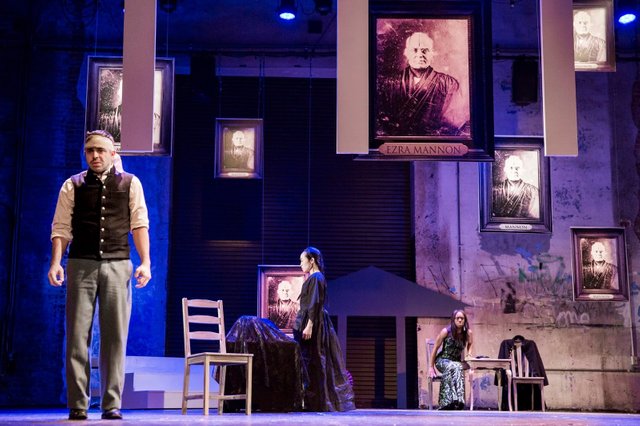
MBE at the Target Margin Theater src
In the beginning, Christine Mannon feels followed around the room by the eyes of the dead Mannons in portraits and berates them, as does her daughter later in the play.
Secret-lookin'—'s if it was a mask she'd put on. That's the Mannon look. They all has it. They grow it on their wives.
Overall, it’s a fascinating play, exploring a lot of interesting concepts popular at the time, especially those in Freudian psychoanalysis, such as the Oedipus complex and the Electra complex. Like many plays of the 20th century, they took on a dark tone, addressing a lot of delicate topics, such as incest, repression and suicide. It goes right to the heart of what it means to be human, you know, the nasty stuff, not just the pretty pink flowers.
It’s a remarkable piece of writing and I would recommend reading it, rather than watching it (though I’m sure there are some great adaptations out there), since it’s a very rich text and you’re bound to miss some themes/concepts/images if you don’t read it.
Have you read/seen ‘Mourning Becomes Electra’?
Authored by @honeydue
References 1 2
Original Thumbnail Pic
Click on the coin to join our Discord Chat

Witness proposal is here:
Go To Steem Witness Page
In the bottom of the page type: adsactly-witness and press vote.

Use small letters and no "@" sign. Or, click here to vote directly!
Thank you!
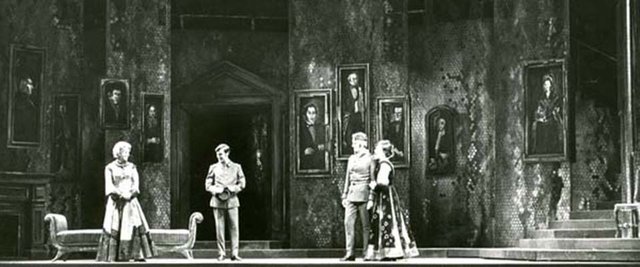


I like the theater and Shakespeare, "Romeo and Juliet"
I like Romeo and Juliet too :) Not sure if we will feature them in our series just yet, but you never know :D
Beautiful work and its detailed analysis of it even better.
Thank you! I try to keep the analysis short enough so that it's easy to follow, but detailed enough for people to learn something :) I'm glad you enjoyed it!
I have not read or seen the representation of this piece, but with your work you have awakened my curiosity. From what you say, this piece is rich in symbols and certain references that would be worth studying. Just as I was reading the review of 'Mourning Becomes Electra' I remembered the work Oresteia. I have seen Aeschylus's work represented many times and it is always striking the degree of revenge in the story and the difficulty that some characters have in accepting and facing their mistakes, the guilt of their actions. This series is interesting to me because I'm sure I'll find here works that I haven't read and others that I already know. Although reading theatre is not the best, the ideal would be to see the play performed, but I'm satisfied. ;) Greetings
Glad you found something new through this and I hope you enjoy it, if you do decide to see/read it :D I read it just recently and couldn't put it down.
I agree it's ideal to see theater rather than read it, but there are so many bad adaptations out there that sometimes you hate a play because it was poorly shown in theater and then discover it's a really great play, originally :) Thanks for commenting!
Hi, @adsactly!
You just got a 0.31% upvote from SteemPlus!
To get higher upvotes, earn more SteemPlus Points (SPP). On your Steemit wallet, check your SPP balance and click on "How to earn SPP?" to find out all the ways to earn.
If you're not using SteemPlus yet, please check our last posts in here to see the many ways in which SteemPlus can improve your Steem experience on Steemit and Busy.
From Eugene O'Neill I have only been able to read and see represented - many years ago - his work Long Journey from Day to Night, a title that in itself is a poem. Reading your review of A Electra's mourning suits him, I can notice the author's use of autobiographical elements. Expressed in a special way in the family drama (in the case of the play you're commenting on, the drama comes from the tragedy). Now, that tragic sense seems to be a feeling and concept that 0'Neill places in the conditions of the individual, who, if not signalled by the truth, makes decisions about his personal destiny. It could be said that the Erinias inhabit the psyche and disturbed heart of the characters, and their task is replaced by their will.
I thank you for your very thorough work, @honeydue, which I have read with great interest. Greetings.
O'Neill was a master and we'll definitely feature more of his works in this series :D Thanks for commenting!